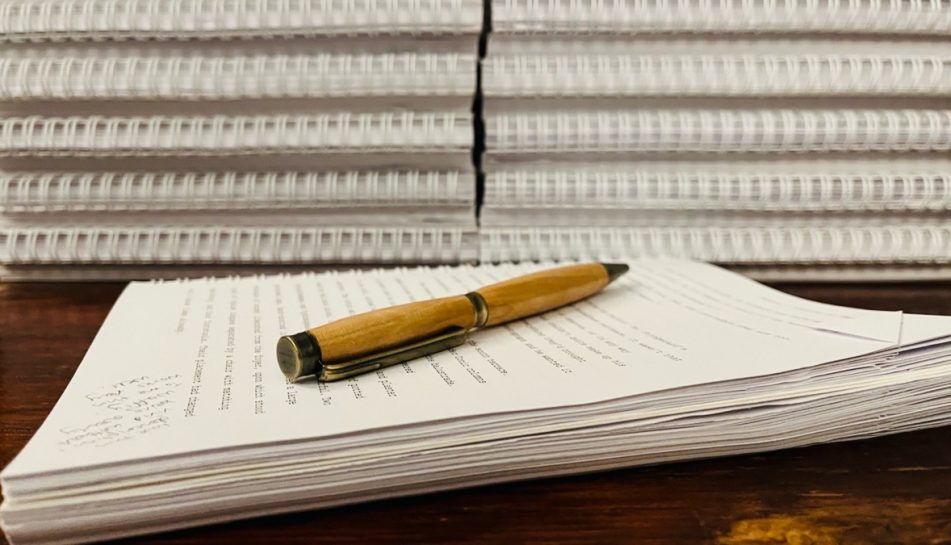Nearly four months have flown by since I first posted about beta reading and the methodology I’ve used for gathering feedback on Avarice of Empire. The usefulness of the process has far exceeded my expectations.
In order to ensure everyone had a way to provide anonymous quantitative feedback, I created a brief online survey that asked a number of questions requiring 0-10 rating answers. Sixteen beta readers have now completed that survey, and some of them volunteered detailed qualitative feedback as well.
Three of the nine questions in the survey related to specific characters and readers’ emotional responses to the story. Those answers are helpful to me, but wouldn’t make much sense in this summary. The six main questions, with their average ratings, were as follows:
Overall, how much did you enjoy the story?
8.1 / 10 (50% rated it 9 or 10)
Overall, how much did you enjoy the style of writing?
8.8 / 10 (67.5% rated it 9 or 10)
To what extent did the first page (or first couple of pages) of the first chapter grab you?
7.1 / 10 (32.5% rated it 9 or 10)
To what extent did the last few chapters satisfactorily complete the story for you?
8.8 / 10 (67.5% rated it 9 or 10)
To what extent did you find the ‘Historical Note’ interesting?
9.5 / 10 (93.75% rated it 9 or 10)
If Avarice of Empire was published, how likely would you be to recommend it to others?
8.2 / 10 (43.75% rated it 9 or 10)
The average of those averages is 8.4 out of 10, which I am of course delighted with. However, one of the purposes of the beta reading process (really THE purpose) was to identify feedback trends that would inform revisions to the manuscript.
Although not a poor score in isolation, the 7.1 average rating for the question about the first page(s) of the first chapter particularly stands out compared to the others. Qualitative feedback also highlighted the weakness of the opening scene of the story, so it was obvious I needed to fix that problem. I’ve since completely re-written the first half of chapter one, and it’s so much better than the original version.
Other ratings need a little interpretation, and that’s made possible thanks to a few beta readers waiving their anonymity with the survey. For example, the 8.8 average rating for the question about how well the last few chapters completed the story isn’t higher because some people wanted to know what happened next for a selection of characters (which is a good thing.) The 8.2 average rating for the one about recommending the book to others was apparently tempered by beta readers taking into account that they might only recommend Avarice of Empire to people who enjoyed history (even though historical fiction was a new or only occasional genre for the vast majority of beta readers.)
The lowest ratings in the survey came from a beta reader who’d been recommended to me as someone with “a passionate interest in military history.” However, it became apparent from their other feedback that what that really meant was a strong preference for commercial military fiction filled with blood-soaked battle scenes (which Avarice of Empire most definitely is not.) That doesn’t make their feedback any less useful, and in a sense it gives extra weight to their more generous ratings, but the context is relevant to understand.
Aside from the ineffectiveness of the opening scene, two other important trends emerged from beta readers’ qualitative feedback.
Firstly, it was clear that the personality and presence within the story of one of the main characters weren’t as strong as they needed to be to create an appropriate level of reader empathy. The re-written first chapter is part of the solution to that problem, but I’ve also made a number of other edits and written a completely new chapter.
The other trend relates to prior knowledge of the story. As I mentioned in my first post in February, half of the beta readers were told about the “…by the hand of an assassin…” wording on Charles Agnew’s memorial at Canterbury Cathedral before they started reading, while the other half had no background information at all. Although that doesn’t seem to have influenced the 0-10 survey ratings, it certainly had a profound impact on the way people engaged with the story and the assumptions they made about where it was heading while they were reading. On balance, it became clear that prior knowledge significantly increased reader empathy and investment. I’ve therefore added a new opening section to the prologue, which transports readers to the south aisle of Canterbury Cathedral.
I can’t overstate how invaluable the beta reading process has been to improving the Avarice of Empire manuscript, and I’d like to reiterate my thanks to all those who’ve given up their time to take part.




